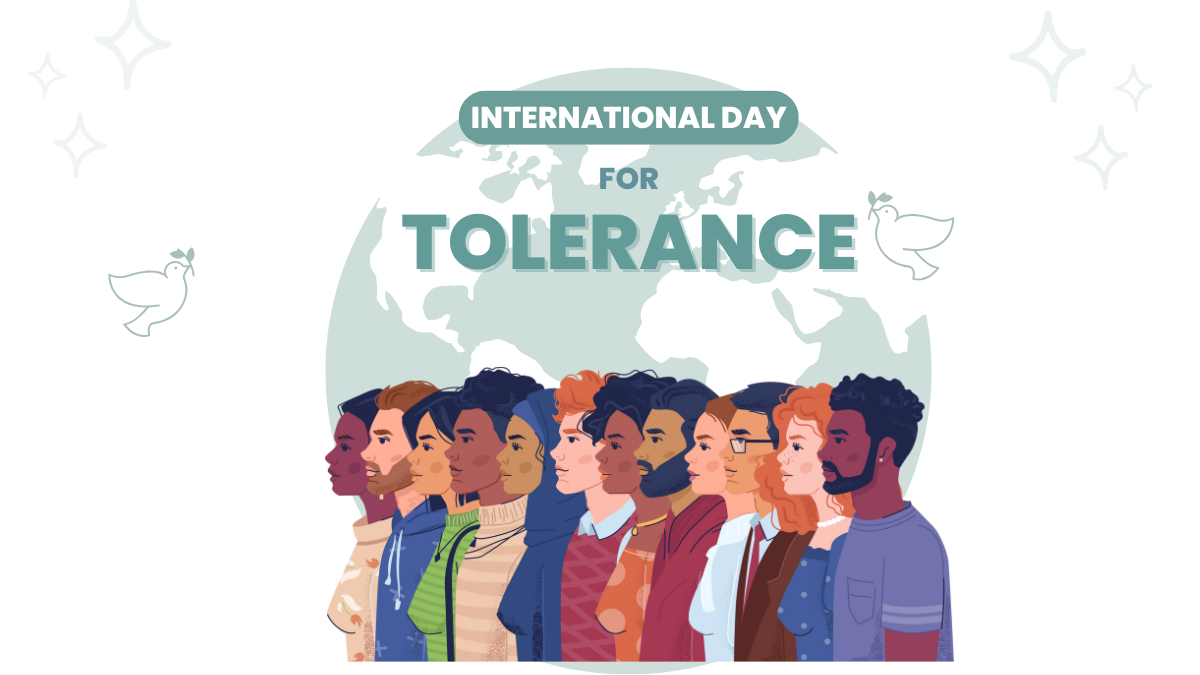The International Day for Tolerance is observed every year on November 16 to promote mutual understanding among cultures and encourage tolerance among individuals. In an increasingly interconnected world, tolerance is the foundation of peaceful coexistence and harmonious societies. This day serves as a reminder of the dangers of intolerance and the critical role of acceptance in building a better world.
Understanding Tolerance: A Key to Unity
The term ‘toleration’ originates from the Latin word ‘tolerantia,’ meaning to endure or accept something, even when it is considered disagreeable or unacceptable. Tolerance involves recognizing and respecting others’ opinions, beliefs, and practices, even if they differ from one’s own.
The Essence of Tolerance
- Tolerance is about fairness, open-mindedness, and respect.
- It involves rejecting prejudice, discrimination, and bias while embracing diversity.
- Intolerance, its opposite, manifests in rejection or hostility toward those with differing views or identities. For instance, conflicts like those between Israelis and Palestinians highlight the destructive effects of intolerance.
The History of the International Day for Tolerance
The International Day for Tolerance was officially proclaimed in 1996 by the United Nations General Assembly. Its foundation lies in the Declaration of Principles on Tolerance adopted by UNESCO in 1995. This day underscores the need for societies to uphold human rights and celebrate cultural diversity.
UNESCO’s Role
- In 1994, UNESCO commemorated the 125th anniversary of Mahatma Gandhi’s birth, promoting his ideals of non-violence and acceptance.
- This initiative paved the way for the UN to designate November 16 as the International Day for Tolerance.
- UNESCO has since been at the forefront of promoting tolerance through education, awareness programs, and global initiatives.
UNESCO-Madanjeet Singh Prize for the Promotion of Tolerance and Non-Violence
In 1995, to celebrate the United Nations Year for Tolerance and Mahatma Gandhi’s legacy, UNESCO established the Madanjeet Singh Prize for the Promotion of Tolerance and Non-Violence.
This prize honors individuals or institutions that have significantly contributed to advancing tolerance and non-violence in various fields, including science, culture, and communication.
Objective of the Prize
- Recognizing outstanding projects that foster dialogue and peace.
- Promoting awareness about tolerance and non-violence.
- Encouraging global collaboration to tackle issues like discrimination and bias.
The prize is rooted in UNESCO’s Constitution, which emphasizes that peace must be built on moral and intellectual solidarity among humankind.
Significance of the International Day for Tolerance
The International Day for Tolerance carries profound significance in today’s polarized world. It serves as a call to action for individuals, communities, and governments to foster acceptance and fight prejudice.
Encouraging Respect for Differences
- The day highlights the importance of respecting cultural, religious, and ideological differences.
- It aims to foster harmony in diverse and mixed communities, where individuals from various backgrounds coexist.
Fighting Against Intolerance
- Intolerance leads to social divisions, discrimination, and even violence.
- The day raises awareness about the risks of intolerance and the need to embrace fairness and equity in society.
Building Inclusive Communities
- Tolerance promotes peaceful and equitable communities where every individual is valued.
- It motivates future generations to prioritize unity over division.
A Push for Transformation
Since its inception, the International Day for Tolerance has driven significant global efforts to combat intolerance. The day has inspired:
- Educational Initiatives: Schools worldwide implement programs to teach children about diversity, empathy, and respect.
- Community Dialogues: Local and international platforms for discussions on promoting tolerance and reducing bias.
- Collaborative Efforts: Nations working together to address global challenges like racism, xenophobia, and religious intolerance.
Objectives of the International Day for Tolerance
- Raising Awareness: Educating people about the importance of tolerance in creating peaceful societies.
- Fostering Kindness: Encouraging individuals to be open-minded and kind, regardless of cultural or social differences.
- Highlighting Risks of Intolerance: Demonstrating the harmful effects of prejudice and discrimination.
- Promoting Human Rights: Emphasizing equality and the universality of human rights.
Significance in Today’s Context
In today’s globalized world, where diverse cultures intermingle, the importance of tolerance cannot be overstated.
- Encouraging Acceptance: The day reminds people to value diversity and coexist peacefully.
- Fighting Prejudice: It urges communities to reject discrimination based on race, religion, gender, or nationality.
- Promoting Unity: The day inspires individuals to work together for a more inclusive future.
Summary of the News
| Aspect | Details |
|---|---|
| Event | International Day for Tolerance |
| Date | November 16 |
| Proclaimed By | United Nations General Assembly (1996) |
| Initiated By | UNESCO, through the Declaration of Principles on Tolerance (1995) |
| Historical Significance | Commemorates the 125th birth anniversary of Mahatma Gandhi and promotes his ideals of non-violence and tolerance. |
| Purpose | To promote mutual understanding, respect for diversity, and fight against intolerance worldwide. |
| Key Objectives | – Raise awareness about tolerance. – Foster kindness and understanding. – Highlight the risks of intolerance. – Promote equality and human rights. |
| Significance | – Encourages respect for cultural, religious, and ideological differences. – Builds inclusive and harmonious communities. – Fights against prejudice and discrimination. |
| UNESCO-Madanjeet Singh Prize | – Established in 1995 to honor contributions towards tolerance and non-violence. – Recognizes achievements in fields like science, culture, and communication. |
| Impact | – Inspired educational initiatives on tolerance. – Promoted community dialogues. – Encouraged global collaboration to combat intolerance. |
| Why in News? | Observed globally on November 16, 2024, to emphasize the importance of tolerance in today’s interconnected and diverse world. |



 National Women's Day 2026 India: Signifi...
National Women's Day 2026 India: Signifi...
 World Radio Day 2026: Why Radio Still Ma...
World Radio Day 2026: Why Radio Still Ma...
 National Productivity Council Marks 68th...
National Productivity Council Marks 68th...








